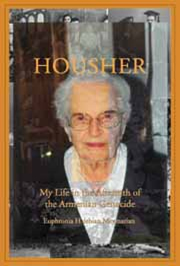
Housher: My Life in the Aftermath of the Armenian Genocide
London : Taderon Press, 2005,
102 pp, photos,
ISBN 1-903656-42-7, paper,
UK£10.00 / US$15.00
To order please contact books@gomidas.org
Publications like "Housher" recount to us the experiences of those who created innumerable Armenian communities from the first Republic of Armenia to Lebanon, France and the United States. Those who emerged from the Genocide proactively took up the task of being producers of modern Armenian culture in the broadest sense of the word "culture". The value of Euphronia’s account lies not only in how she and her family "survived" the physical process of ethnic cleansing [during the Armenian Genocide of 1915]— as that is almost a trope — but in how the narrative chronicles the subsequent struggles to forge a life and culture for herself, her family, and her local community. This differs from saying that her autobiography attempts to preserve unquestionably the social structure and cultural practices of a decimated Armenian community, because Euphronia is blatantly critical of and defies many restrictions, norms, and mores of traditional Armenian and Arab societies. Those [survivors] like Euphronia carried the scars of history without allowing it to hold them down. Her indomitable desire to complete her education is indicative of how "survivors" worked tirelessly to create, continue, enjoy, and expand an Armenian culture that is "hybrid" and heterogeneous but still completely valid as a "national culture". Committing her life to posterity supplies for Armenians and non-Armenians a map of how our putative culture and identities were generated through the prolific efforts and determination of that generation known as "survivors".
From the foreword of Prof. Stephen Sheehi, American University of Beirut, Lebanon.
From the foreword of Prof. Stephen Sheehi, American University of Beirut, Lebanon.